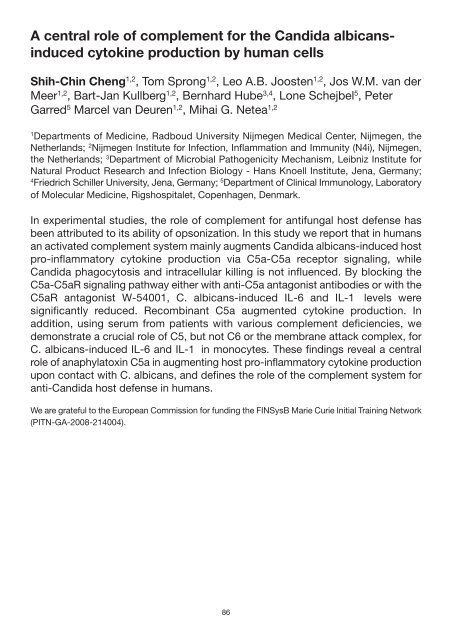Candida Infection Biology – fungal armoury, battlefields ... - FINSysB
Candida Infection Biology – fungal armoury, battlefields ... - FINSysB
Candida Infection Biology – fungal armoury, battlefields ... - FINSysB
Create successful ePaper yourself
Turn your PDF publications into a flip-book with our unique Google optimized e-Paper software.
A central role of complement for the <strong>Candida</strong> albicansinduced<br />
cytokine production by human cells<br />
Shih-Chin Cheng 1,2 , Tom Sprong 1,2 , Leo A.B. Joosten 1,2 , Jos W.M. van der<br />
Meer 1,2 , Bart-Jan Kullberg 1,2 , Bernhard Hube 3,4 , Lone Schejbel 5 , Peter<br />
Garred 5 Marcel van Deuren 1,2 , Mihai G. Netea 1,2<br />
1 Departments of Medicine, Radboud University Nijmegen Medical Center, Nijmegen, the<br />
Netherlands; 2 Nijmegen Institute for <strong>Infection</strong>, Inflammation and Immunity (N4i), Nijmegen,<br />
the Netherlands; 3 Department of Microbial Pathogenicity Mechanism, Leibniz Institute for<br />
Natural Product Research and <strong>Infection</strong> <strong>Biology</strong> - Hans Knoell Institute, Jena, Germany;<br />
4 Friedrich Schiller University, Jena, Germany; 5 Department of Clinical Immunology, Laboratory<br />
of Molecular Medicine, Rigshospitalet, Copenhagen, Denmark.<br />
In experimental studies, the role of complement for anti<strong>fungal</strong> host defense has<br />
been attributed to its ability of opsonization. In this study we report that in humans<br />
an activated complement system mainly augments <strong>Candida</strong> albicans-induced host<br />
pro-inflammatory cytokine production via C5a-C5a receptor signaling, while<br />
<strong>Candida</strong> phagocytosis and intracellular killing is not influenced. By blocking the<br />
C5a-C5aR signaling pathway either with anti-C5a antagonist antibodies or with the<br />
C5aR antagonist W-54001, C. albicans-induced IL-6 and IL-1 levels were<br />
significantly reduced. Recombinant C5a augmented cytokine production. In<br />
addition, using serum from patients with various complement deficiencies, we<br />
demonstrate a crucial role of C5, but not C6 or the membrane attack complex, for<br />
C. albicans-induced IL-6 and IL-1 in monocytes. These findings reveal a central<br />
role of anaphylatoxin C5a in augmenting host pro-inflammatory cytokine production<br />
upon contact with C. albicans, and defines the role of the complement system for<br />
anti-<strong>Candida</strong> host defense in humans.<br />
We are grateful to the European Commission for funding the <strong>FINSysB</strong> Marie Curie Initial Training Network<br />
(PITN-GA-2008-214004).<br />
86


